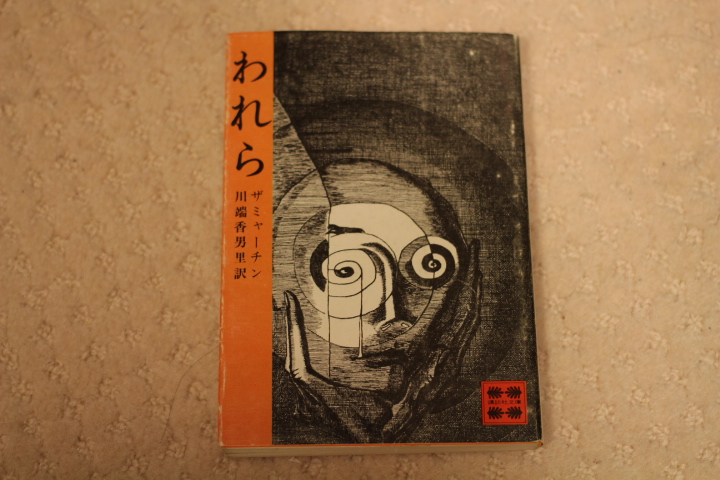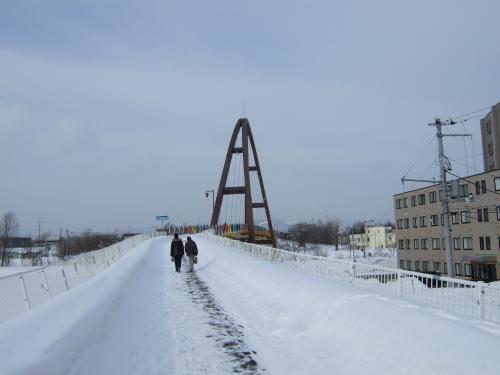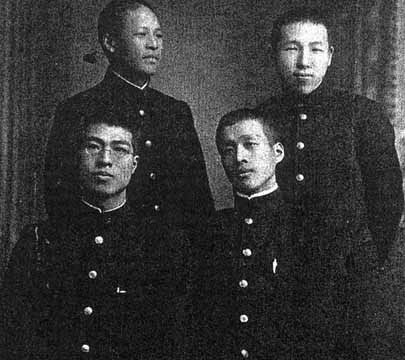2015年1月15日 木曜日
ザミャーチン われら 川端香男里訳 講談社文庫 1975年 (もとは講談社の海外秀作シリーズとして1970年に刊行) 読了。

原作は1920-1921年頃(ザミャーチン36歳頃)に書かれ、筆写されて人々の間に流布され、1924年にはザミャーチン自身が全ロシア作家同盟の会合で朗読し、作家の仲間うちではよく知られた作品となっていた。1924年に英訳、1927年にチェック訳、ついでプラハの亡命者系の雑誌「ロシアの意思」にロシア語で発表された。・・・ロシア語で発表したことはソビエト当局に対する公然たる挑戦であるということにされ、一斉に攻撃を受けることになった。(同書、解説p313より引用)
この作品は社会学主流のSFのうちの「もしもこれがこのまま続いたら」タイプの作品である。(ditto, p317)
数学と秩序が大いなる調和と幸福をもたらしているこの国を熱烈に愛している技師D-503号は、一人の女性への愛に惹かれてこの国の反乱計画と関係をもつことになっていく。それはまだ自由の余地が「革命」後、千年もたってもまだ残されていて、まだ完全ではなかったためなのである。やがて自由といういらざる幻想を生む想像力の摘出手術が人々に行われ、やがてより完全な国が生まれることになる。 この作品についてはザミャーチン自身が、「この小説は人類をおびやかしている二重の危険ーーーつまり機械の異常に発達した力と国家の異常に発達した力ーーーに対する警告である」と語っている。・・・・このままでは必然的にやって来てしまうユートピア(つまり、アンチユートピア)の否定的側面を見事に結晶させた最初の作品としての栄誉はザミャーチンに属する。(ditto, p318)
*****
この本を読んだきっかけ: 西谷修さんの「夜の鼓動にふれる 戦争論講義」で紹介推薦されていたのがきっかけ。
引き込まれるようにして読み進んでいった。が、十分に理解できているか? 「映画的なフラッシュバックや、地の描写の部分ときわだった対照をなして浮きあがってくる表現主義風のグロテスクな会話・・・心象風景が自然描写と一体となり、登場人物の無意識の衝動の描写が時としては超現実主義的次元へと移ってゆく・・・このような手法はいずれも`われら`のなかでも用いられることとなる。」(ditto, p310) この小説を翻訳で一度読んだだけで十分に理解することは不可能だと感じる。
それでもこの作家は魅力的でもう一度、また、もっと別の作品も読んでみたいと思う。ところが、日本語への翻訳というとほとんどなさそうなのである。何とか掘り返して進んでみたいと思うが。
*****
wikiで調べてみると: エヴゲーニイ・イワーノヴィチ・ザミャーチン(ロシア語:Евге́ний Ива́нович Замя́тин, 1884年2月1日 – 1937年3月10日)は、ロシアの作家。ソ連文学界は、文学史からも、彼と代表作『われら』の存在を、忌むべきレーニン批判の反革命作家・小説として完全に抹殺していたがペレストロイカ以降、再評価されるようになった。wikiより引用。
さらに孫引きすると: Yevgeny Ivanovich Zamyatin (1884-1937) – name also written Evgenii Ivanovich Zamiatin
http://www.kirjasto.sci.fi/zamyatin.htm より <以下、WEBサイトより引用>
Russian novelist, playwright, short story writer, and essayist, whose famous anti-utopia My (1924, We) prefigured Aldous Huxley’s Brave New World (1932), and inspired George Orwell’s 1984 (1949). The book was considered a “malicious slander on socialism” in the Soviet Union, and it was not until 1988 when Zamyatin was rehabilitated. In the English-speaking world My has appeared in several translations. ”And then, just the way it was this morning in the hangar, I saw again, as though right then for the first time in my life, I saw everything: the unalterably straight streets, the sparkling glass of the sidewalks, the divine parallelepipeds of the transparent dwellings, the squared harmony of our gray-blue ranks. And so I felt that I ? not generations of people, but I myself ? I had conquered the old God and the old life, I myself had created all this, and I’m like a tower, I’m afraid to move my elbow for fear of shattering the walls, the cupolas, the machines…” (in We, tr. Clarence Brown, 1993)
さらに引用すると
We, completed in 1921, was the only full-length novel Zamyatin wrote. Extracts from the original text were published in an *igre journal in Prague in 1927. In Russia We circulated in manuscripts. At an imaginative level, claims the author Martin Seymour-Smith in The 100 Most Influential Books Ever Written (1998), We is “far above even Nineteen Eighty-Four”. Besides Orwell, We inspired Huxley’s Brave New World, although the latter writer did not acknowledge this fact. The first English translation was published in 1924, in the 1970s appeared two translations, and also in the 1990s, when the Soviet Union collapsed. Orwell got in his hands a French translation, entitled Nous Autres, not the American edition from 1924. In his review in Tribune (4 January, 1946) Orwell wrote: “So far as I can judge it is not a book of the first order, but it is certainly an unusual one, and it is astonishing that no English publisher has been enterprising enough to reissue it.” Orwell urged Fredric Warburg to publish the work.
講談社版の川端香男里さんの解説でも上記パラグラフとほぼ同様の記載がなされている。
さらに引用を続けると:
The story is set in the twenty-sixth century A.D. in a totalitarian, standardized One State of the future. Its dictator is the all-powerful “Benefactor,” who offers the citizens, called Numbers, security and material affluence but not freedom. All the citizens wear identical grey-blue unifiorms with bandages bearing their numbers. There is no freedom, because freedom and crime are closely connected: “If man’s freedom is nil, he commits no crimes.” Special guardians spy upon the behaviour and morals of the numbers. The narrator, D-503, is an engineer and chief mathematician of the state, who fully accepts the total control and rationality of the mechanized and centralized state. He is terminating the construction of an interplanetary vessel and begins to write notes for the inhabitants of other planets. However, his observations in his diary reveal a huge* between the reality and his orthodox view of it: “And the what a sky! Blue, unsullied by a single cloud (what primitive tastes of the ancients must have had if their poets were inspired by those absurd, untidy clumps of mist, idiotically jostling one another about). I love – and I am sure I am right in saying we love – only such a sky as this one: sterile and immaculate. On days like this the whole world seems to have been cast of the same immovable and everlasting glass as the Green Wall, as all of our structures. On days like this you can see into the deep blue depth of things, you see their hitherto unsuspected, astonishing equations – you see this in the most ordinary, the most everyday things.”
*huge という単語には名詞的用法はないので、この後ろにあった言葉が欠落していると思われる。とりあえず、gap, discrepancy, contradiction・・・などの言葉を補って意味をとっておきたい。
さらに引用を続ける:
D-503 falls in love with I-330, a member of a revolutionary group, but their love is doomed. The caretaker of D’s house makes a report to the guardians. Like in 1984, love is destroyed by the totalitarian system. D-503 becomes again the faithful servant of the One State when his imagination is removed in the Great Operation. I-330 and other revolutionaries are subjected to torture and sent to the modern improved guillotine. Though Zamyatin’s target in We was not the NEP Period in early Soviet history, but a highly rationalized industrial society, the book was also a prophecy of Stalinism. As Gleb Struve said in 25 Years of Soviet Russian Literature: 1918-1943, “It is obvious that in this institution of guardians the Communist Government should see a satire of certain of its own methods.” Zamyatin’s vision of a rule-dominated society owes much to his experiences in war-time Britain.
<以上、http://www.kirjasto.sci.fi/zamyatin.htm より、引用終わり>
**********







